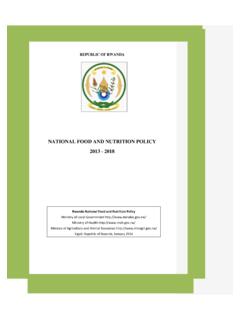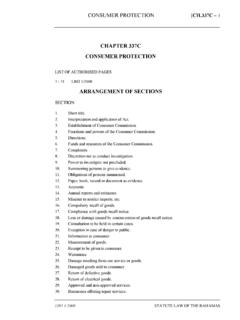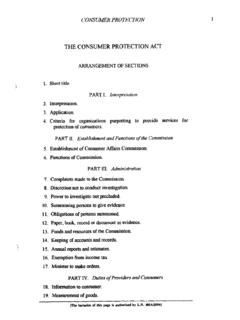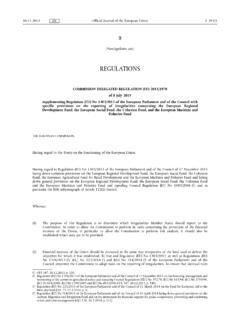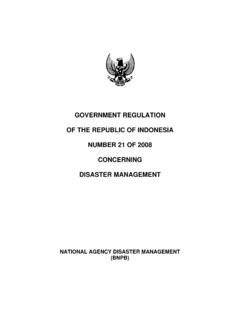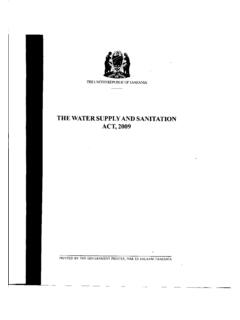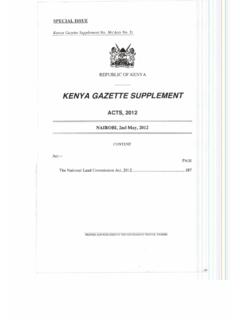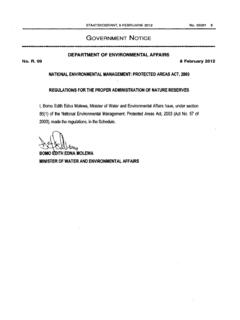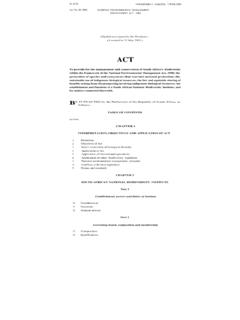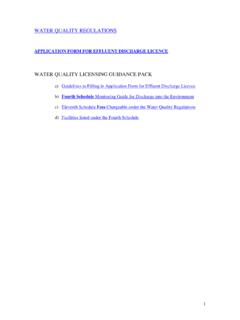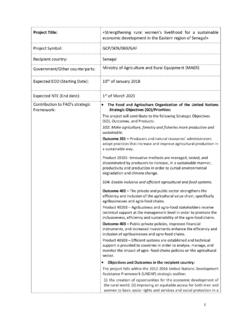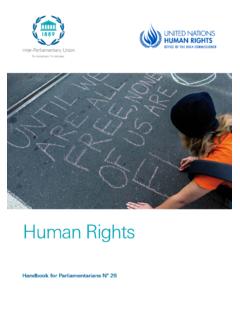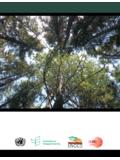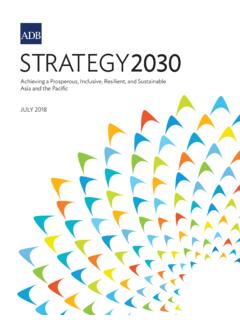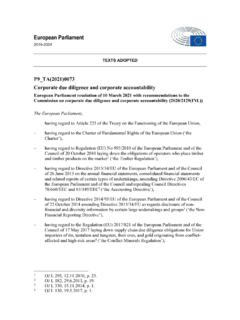Transcription of Republic Act No. 8371 | GOVPH - Food and Agriculture ...
1 Republic Act No. 8371 | GOVPHAN ACT TO RECOGNIZE, PROTECT AND PROMOTE THE RIGHTS OF INDIGENOUS CULTURALCOMMUNITIES/INDIGENOUS PEOPLES, CREATING A NATIONAL COMMISSION ON INDIGENOUSPEOPLES, ESTABLISHING IMPLEMENTING MECHANISMS, APPROPRIATING FUNDS THEREFOR, ANDFOR OTHER PURPOSESCHAPTER IGeneral ProvisionsSECTION 1. Short Title. This Act shall be known as The Indigenous Peoples Rights Act of 1997 .SECTION 2. Declaration of State Policies. The State shall recognize and promote all the rights ofIndigenous Cultural Communities/Indigenous Peoples (ICCs/IPs) hereunder enumerated within theframework of the Constitution:a) The State shall recognize and promote the rights of ICCs/IPs within the framework of nationalunity and development b) The State shall protect the rights of ICCs/IPs to their ancestral domains to ensure their economic, social and cultural well being and shall recognize the applicability of customary laws governing propertyrights or relations in determining the ownership and extent of ancestral domain c) The State shall recognize, respect and protect the rights of ICCs/IPs to preserve and developtheir cultures, traditions and institutions.
2 It shall consider these rights in the formulation of national laws andpolicies d) The State shall guarantee that members of the ICCs/IPs regardless of sex, shall equally enjoy thefull measure of human rights and freedoms without distinction or discrimination e) The State shall take measures, with the participation of the ICCs/IPs concerned, to protect theirrights and guarantee respect for their cultural integrity, and to ensure that members of the ICCs/IPs benefiton an equal footing from the rights and opportunities which national laws and regulations grant to othermembers of the population andf) The State recognizes its obligations to respond to the strong expression of the ICCs/IPs forcultural integrity by assuring maximum ICC/IP participation in the direction of education, health, as well asother services of ICCs/IPs, in order to render such services more responsive to the needs and desires ofthese these ends, the State shall institute and establish the necessary mechanisms to enforce andguarantee the realization of these rights, taking into consideration their customs, traditions, values, beliefs,interests and institutions, and to adopt and implement measures to protect their rights to their IIDefinition of TermsSECTION 3.
3 Definition of Terms. For purposes of this Act, the following terms shall mean:a) Ancestral Domains Subject to Section 56 hereof, refer to all areas generally belonging toICCs/IPs comprising lands, inland waters, coastal areas, and natural resources therein, held under a claimof ownership, occupied or possessed by ICCs/IPs, by themselves or through their ancestors, communally orindividually since time immemorial, continuously to the present except when interrupted by war, forcemajeure or displacement by force, deceit, stealth or as a consequence of government projects or any othervoluntary dealings entered into by government and private individuals/corporations, and which arenecessary to ensure their economic, social and cultural welfare. It shall include ancestral lands, forests,pasture, residential, agricultural, and other lands individually owned whether alienable and disposable orotherwise, hunting grounds, burial grounds, worship areas, bodies of water, mineral and other naturalresources, and lands which may no longer be exclusively occupied by ICCs/IPs but from which theytraditionally had access to for their subsistence and traditional activities, particularly the home ranges ofICCs/IPs who are still nomadic and/or shifting cultivators b)
4 Ancestral Lands Subject to Section 56 hereof, refers to land occupied, possessed and utilizedby individuals, families and clans who are members of the ICCs/IPs since time immemorial, by themselves orthrough their predecessors in interest, under claims of individual or traditional group ownership,continuously, to the present except when interrupted by war, force majeure or displacement by force, deceit,stealth, or as a consequence of government projects and other voluntary dealings entered into bygovernment and private individuals/corporations, including, but not limited to, residential lots, rice terraces orpaddies, private forests, swidden farms and tree lots c) Certificate of Ancestral Domain Title refers to a title formally recognizing the rights ofpossession and ownership of ICCs/IPs over their ancestral domains identified and delineated in accordancewith this law d) Certificate of Ancestral Lands Title refers to a title formally recognizing the rights of ICCs/IPsover their ancestral lands e) Communal Claims refer to claims on land, resources and rights thereon, belonging to thewhole community within a defined territory f) Customary Laws refer to a body of written and/or unwritten rules, usages, customs andpractices traditionally and continually recognized, accepted and observed by respective ICCs/IPs g)
5 Free and Prior Informed Consent as used in this Act shall mean the consensus of all membersof the ICCs/IPs to be determined in accordance with their respective customary laws and practices, freefrom any external manipulation, interference and coercion, and obtained after fully disclosing the intent andscope of the activity, in a language and process understandable to the community h) Indigenous Cultural Communities/Indigenous Peoples refer to a group of people orhomogenous societies identified by self ascription and ascription by others, who have continuously lived asorganized community on communally bounded and defined territory, and who have, under claims ofownership since time immemorial, occupied, possessed and utilized such territories, sharing common bondsof language, customs, traditions and other distinctive cultural traits, or who have, through resistance topolitical, social and cultural inroads of colonization, non indigenous religions and cultures, becamehistorically differentiated from the majority of Filipinos.
6 ICCs/IPs shall likewise include peoples who areregarded as indigenous on account of their descent from the populations which inhabited the country, at thetime of conquest or colonization, or at the time of inroads of non indigenous religions and cultures, or theestablishment of present state boundaries, who retain some or all of their own social , economic, cultural andpolitical institutions, but who may have been displaced from their traditional domains or who may haveresettled outside their ancestral domains i) Indigenous Political Structures refer to organizational and cultural leadership systems,institutions, relationships, patterns and processes for decision making and participation, identified byICCs/IPs such as, but not limited to, Council of Elders, Council of Timuays, Bodong Holders, or any othertribunal or body of similar nature j) Individual Claims refer to claims on land and rights thereon which have been devolved toindividuals, families and clans including, but not limited to, residential lots, rice terraces or paddies and treelots k) National Commission on Indigenous Peoples (NCIP)
7 Refers to the office created under this Act,which shall be under the Office of the President, and which shall be the primary government agencyresponsible for the formulation and implementation of policies, plans and programs to recognize, protect andpromote the rights of ICCs/IPs l) Native Title refers to pre conquest rights to lands and domains which, as far back as memoryreaches, have been held under a claim of private ownership by ICCs/IPs, have never been public lands andare thus indisputably presumed to have been held that way since before the Spanish Conquest m) Nongovernment Organization refers to a private, nonprofit voluntary organization that has beenorganized primarily for the delivery of various services to the ICCs/IPs and has an established track recordfor effectiveness and acceptability in the community where it serves n) People s Organization refers to a private, nonprofit voluntary organization of members of anICC/IP which is accepted as representative of such ICCs/IPs o) Sustainable Traditional Resource Rights refer to the rights of ICCs/IPs to sustainably use,manage, protect and conserve a) land, air, water, and minerals b) plants, animals and other organisms c)collecting, fishing and hunting grounds d) sacred sites and e)
8 Other areas of economic, ceremonial andaesthetic value in accordance with their indigenous knowledge, beliefs, systems and practices andp) Time Immemorial refers to a period of time when as far back as memory can go, certainICCs/IPs are known to have occupied, possessed in the concept of owner, and utilized a defined territorydevolved to them, by operation of customary law or inherited from their ancestors, in accordance with theircustoms and IIIR ights to Ancestral DomainsSECTION 4. Concept of Ancestral Lands/Domains. Ancestral lands/domains shall include suchconcepts of territories which cover not only the physical environment but the total environment including thespiritual and cultural bonds to the areas which the ICCs/IPs possess, occupy and use and to which theyhave claims of 5. Indigenous Concept of Ownership.
9 Indigenous concept of ownership sustains theview that ancestral domains and all resources found therein shall serve as the material bases of theircultural integrity. The indigenous concept of ownership generally holds that ancestral domains are theICC s/IP s private but community property which belongs to all generations and therefore cannot be sold,disposed or destroyed. It likewise covers sustainable traditional resource 6. Composition of Ancestral Lands/Domains. Ancestral lands and domains shall consistof all areas generally belonging to ICCs/IPs as referred under Sec. 3, items (a) and (b) of this 7. Rights to Ancestral Domains. The rights of ownership and possession of ICCs/IPs totheir ancestral domains shall be recognized and protected. Such rights shall include:a) Right of Ownership.
10 The right to claim ownership over lands, bodies of water traditionally andactually occupied by ICCs/IPs, sacred places, traditional hunting and fishing grounds, and all improvementsmade by them at any time within the domains b) Right to Develop Lands and Natural Resources. Subject to Section 56 hereof, right to develop,control and use lands and territories traditionally occupied, owned, or used to manage and conserve naturalresources within the territories and uphold the responsibilities for future generations to benefit and sharethe profits from allocation and utilization of the natural resources found therein the right to negotiate theterms and conditions for the exploration of natural resources in the areas for the purpose of ensuringecological, environmental protection and the conservation measures, pursuant to national and customarylaws the right to an informed and intelligent participation in the formulation and implementation of anyproject, government or private.
